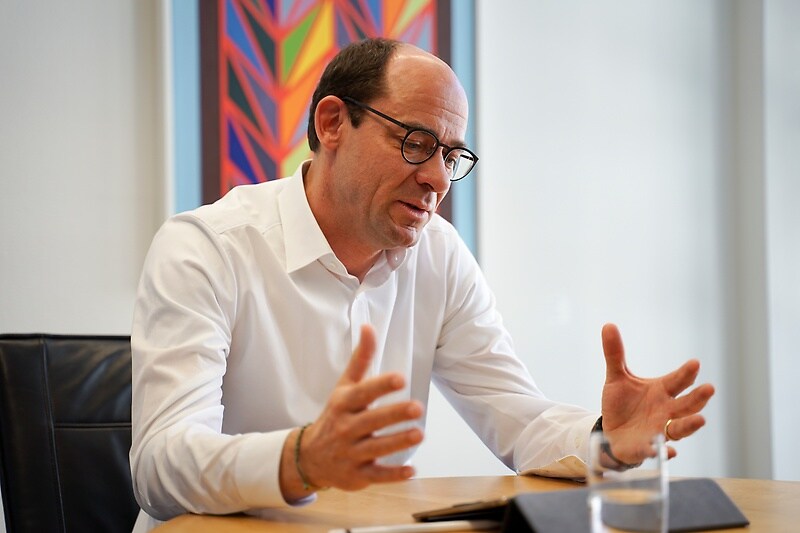A "digitales mindset" at Mercedes-Benz.
What does the digital mindset have to do with the revolution of mobility? CIO Jan Brecht reveals what "The Next Big Thing" at Mercedes-Benz is and describes who we need for it.
Mercedes-Benz AG
Mercedesstraße 120
70372 Stuttgart
Germany
Phone: +49 7 11 17-0
E-Mail: dialog@mercedes-benz.com
Please send queries about content on this website to any contact. You can address your concerns to us in English and your respective national language.
Represented by the Board of Management:
Ola Källenius, Chairman; Jörg Burzer, Renata Jungo Brüngger, Sabine Kohleisen, Markus Schäfer, Britta Seeger, Hubertus Troska, Harald Wilhelm
Chairman of the Supervisory Board: Martin Brudermüller
Court of Registry: Stuttgart; commercial register no. 762873
VAT ID: DE 32 12 81 763
All information about our products can be found on your country-specific Mercedes-Benz product page.

What does the digital mindset have to do with the revolution of mobility? CIO Jan Brecht reveals what "The Next Big Thing" at Mercedes-Benz is and describes who we need for it.

Could you please introduce yourself to our readers?
My name is Jan Brecht and I have the great privilege of being responsible for the IT across all divisions, markets and brands at the company. I studied electrical engineering in Karlsruhe, Southampton and Paris. But, you never stop learning and as a result my sons in particular can still teach me a great deal about current IT trends. They are ten and thirteen years old and, as they say, digital natives. It is incredible how effortlessly they handle the digital world.
Could you please tell us about your career at Mercedes-Benz?
I virtually grew up in the company: After joining in 1997, I saw everything IT had to offer for twelve years. This included stops in Production, Engineering, Marketing and Sales, and at Financial Services. Then I put in a short Mercedes-Benz break and worked at adidas for six years. Since the end of 2015, I am back to work here.
Are we working on the #NextBigThing at Mercedes-Benz?
Have a look at our corporate strategy CASE. Each letter by itself is already transforming mobility. And we are looking at all four fields at the same time! If that isn't the "next big thing," I don't know what is. It's about redefining or revolutionizing mobility.
To what extent does IT turn mobility as we know it today on its head?
IT data is the connecting element of this mobile revolution. That is immediately apparent in the areas of connected cars (connectivity), autonomous driving and shared services. But IT is also the foundation for everything when it comes to electric mobility, questions about the ecosystem or an intelligent charging infrastructure.

What kind of job profiles are currently arising as part of the digital transformation and connectivity?
Data is the foundation of the new mobility. And we need experts who understand the data. This involves the existing data in the company, but also the collection of new data. That is why we are looking for data scientists and, building on this, AI experts who supply and understand the algorithms. Add to that cloud specialists, IT architects and, of course, security experts. Those are job profiles that didn't exist yet a few years ago.
Why is Mercedes-Benz the right employer for IT experts?
For a great many reasons. First of all, we have exciting tasks to work on. The transformation, which we are currently experiencing, did not exist in recent decades. And thanks to our strong brands, we also offer an infrastructure that makes the work highly attractive. By the way, when I say this, I am also referring to the motivated people working here. Across countries and specialist units. These prospects would definitely get me excited as a beginner at Mercedes-Benz.
The industry is trying to respond to the ever faster development cycles with more flexible structures. We at the Mercedes-Benz Group are also talking about agility, swarms, etc. What is your position in this regard?
That is absolutely essential! Speed is the biggest challenge and at the same time elementary to stay ahead of the competition.
How will this work?
By using the right resources. We have clearly defined five priorities in this regard: open-source software, DevOps & cloud, API architecture, security & identity and access management, and above all "people in IT." One example: We are already able to shorten the development cycle of a vehicle massively today by building a so-called "digital twin." This means we use digital simulations in the development and don't need to build any hardware. This speeds up the development process immensely and is an important component for becoming faster in IT.
What do you think is the biggest challenge for the automotive industry in the coming years?
"Software is eating the world“ – that is what Marc Andreessen said [inventor and founder of Netscape, editor's note]. He is talking about the switch from a hardware-based towards a software-based economy. In my opinion, the digital mindset this requires will become extremely important. And by this I mean not only the appropriate qualification of the employees, but the organizational structures as well. We already mentioned swarms and agile working, but the corporate culture also has to become more focused on data.
A last personal question: It's 10:30 am on a Saturday morning. What are you generally doing at this time?
Most likely jogging! I run every Saturday if I can. And entirely without any digital aids!
How do you time your runs then?
Not at all. I run solely for the fun of it.